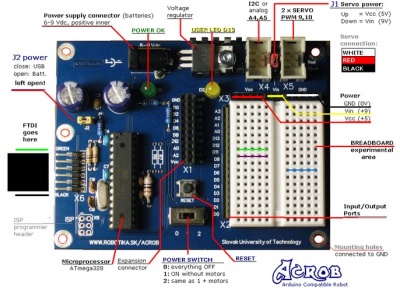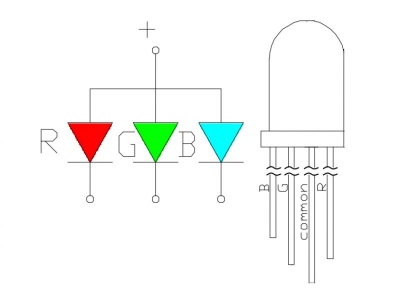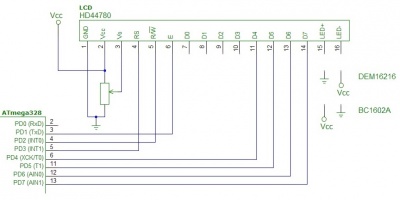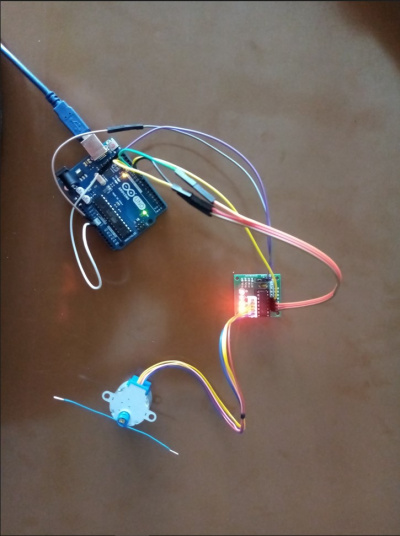Segmentový display TM1637: Rozdiel medzi revíziami
Z SensorWiki
| Riadok 37: | Riadok 37: | ||
#include <avr/io.h> | #include <avr/io.h> | ||
| − | int | + | #define F_CPU 16000000UL //define CPU frequency |
| + | |||
| + | //Required libraries | ||
| + | #include <stdio.h> | ||
| + | #include <avr/io.h> | ||
| + | #include <util/delay.h> | ||
| + | #include <avr/interrupt.h> | ||
| + | |||
| + | #define set_bit(ADDRESS,BIT) (ADDRESS |= (1<<BIT)) | ||
| + | #define clear_bit(ADDRESS,BIT) (ADDRESS &= ~(1<<BIT)) | ||
| + | |||
| + | #define CLK PD5 // CLK -> pin 5 portD.5 | ||
| + | #define DIO PD4 // DIO -> pin 4 portD.4 | ||
| + | |||
| + | #define START_STOP_PIN PD2 // START_STOP_PIN -> pin 2 portD.2 | ||
| + | #define RESET_PIN PD3 // RESET_PIN -> pin 3 portD.3 | ||
| + | |||
| + | |||
| + | #define BIT_DELAY 100 //delay 100ms | ||
| + | |||
| + | //define for TM1637 | ||
| + | #define TM1637_I2C_COMM1 0x40 | ||
| + | #define TM1637_I2C_COMM2 0xC0 | ||
| + | #define TM1637_I2C_COMM3 0x80 | ||
| + | |||
| + | |||
| + | // | ||
| + | // A | ||
| + | // --- | ||
| + | // F | | B | ||
| + | // -G- | ||
| + | // E | | C | ||
| + | // --- | ||
| + | // D | ||
| + | const uint8_t digitToSegment[] = { | ||
| + | // XGFEDCBA | ||
| + | 0b00111111, // 0 | ||
| + | 0b00000110, // 1 | ||
| + | 0b01011011, // 2 | ||
| + | 0b01001111, // 3 | ||
| + | 0b01100110, // 4 | ||
| + | 0b01101101, // 5 | ||
| + | 0b01111101, // 6 | ||
| + | 0b00000111, // 7 | ||
| + | 0b01111111, // 8 | ||
| + | 0b01101111, // 9 | ||
| + | 0b01110111, // A | ||
| + | 0b01111100, // b | ||
| + | 0b00111001, // C | ||
| + | 0b01011110, // d | ||
| + | 0b01111001, // E | ||
| + | 0b01110001 // F | ||
| + | }; | ||
| + | |||
| + | static const uint8_t minusSegments = 0b01000000; | ||
| + | |||
| + | uint8_t brightness = (0x7 & 0x7) | 0x08; | ||
| + | |||
| + | void displayInit(){ | ||
| + | clear_bit(DDRD,CLK); // set CLK as input | ||
| + | set_bit(PORTD,CLK); // CLK as input pull-up on | ||
| + | |||
| + | clear_bit(DDRD,DIO); // set DIO as input | ||
| + | set_bit(PORTD,DIO); // DIO as input pull-up on | ||
| + | } | ||
| + | |||
| + | void startCom(){ | ||
| + | set_bit(DDRD,DIO); // set DIO as output | ||
| + | clear_bit(PORTD,DIO); // set DIO as output | ||
| + | _delay_us(BIT_DELAY); | ||
| + | } | ||
| + | |||
| + | void stopCom(){ | ||
| + | set_bit(DDRD,DIO); // set DIO as output | ||
| + | clear_bit(PORTD,DIO); // set DIO as output | ||
| + | _delay_us(BIT_DELAY); | ||
| + | |||
| + | clear_bit(DDRD,CLK); // set CLK as input | ||
| + | set_bit(PORTD,CLK); // CLK as input pull-up on | ||
| + | _delay_us(BIT_DELAY); | ||
| + | |||
| + | clear_bit(DDRD,DIO); // set DIO as input | ||
| + | set_bit(PORTD,DIO); // DIO as input pull-up on | ||
| + | _delay_us(BIT_DELAY); | ||
| + | } | ||
| + | |||
| + | int displayWriteByte(uint8_t byte){ | ||
| + | uint8_t data = byte; | ||
| + | |||
| + | // 8 Data Bits | ||
| + | for(uint8_t i = 0; i < 8; i++) { | ||
| + | // CLK low | ||
| + | set_bit(DDRD,CLK); | ||
| + | clear_bit(PORTD,CLK); | ||
| + | _delay_us(BIT_DELAY); | ||
| + | |||
| + | // Set data bit | ||
| + | if (data & 0x01){ | ||
| + | clear_bit(DDRD,DIO); // set DIO as input | ||
| + | set_bit(PORTD,DIO); // DIO as input pull-up on | ||
| + | } else{ | ||
| + | set_bit(DDRD,DIO); // set DIO as output | ||
| + | clear_bit(PORTD,DIO); | ||
| + | } | ||
| + | |||
| + | |||
| + | _delay_us(BIT_DELAY); | ||
| + | |||
| + | // CLK high | ||
| + | clear_bit(DDRD,CLK); // set CLK as input | ||
| + | set_bit(PORTD,CLK); // CLK as input pull-up on | ||
| + | _delay_us(BIT_DELAY); | ||
| + | data = data >> 1; | ||
| + | } | ||
| + | |||
| + | // Wait for acknowledge | ||
| + | // CLK to zero | ||
| + | set_bit(DDRD,CLK); // set CLK as output | ||
| + | clear_bit(PORTD,CLK); | ||
| + | |||
| + | clear_bit(DDRD,DIO); // set DIO as input | ||
| + | set_bit(PORTD,DIO); // DIO as input pull-up on | ||
| + | _delay_us(BIT_DELAY); | ||
| + | |||
| + | // CLK to high | ||
| + | clear_bit(DDRD,CLK); // set CLK as input | ||
| + | set_bit(PORTD,CLK); // CLK as input pull-up on | ||
| + | _delay_us(BIT_DELAY); | ||
| + | uint8_t ack = !bit_is_clear(PIND, DIO); | ||
| + | if (ack == 0) | ||
| + | set_bit(DDRD,DIO); // set DIO as output | ||
| + | clear_bit(PORTD,DIO); | ||
| + | |||
| + | |||
| + | |||
| + | _delay_us(BIT_DELAY); | ||
| + | set_bit(DDRD,CLK); // set CLK as output | ||
| + | clear_bit(PORTD,CLK); | ||
| + | _delay_us(BIT_DELAY); | ||
| + | |||
| + | return ack; | ||
| + | } | ||
| + | |||
| + | void displayShowDots(uint8_t dots, uint8_t* digits){ | ||
| + | for(int i = 0; i < 4; ++i) | ||
| + | { | ||
| + | digits[i] |= (dots & 0x80); | ||
| + | dots <<= 1; | ||
| + | } | ||
| + | |||
| + | } | ||
| + | |||
| + | uint8_t displayEncodeDigit(uint8_t digit){ | ||
| + | return digitToSegment[digit & 0x0f]; | ||
| + | } | ||
| + | |||
| + | void displaySetSegments(const uint8_t segments[], uint8_t length, uint8_t pos){ | ||
| + | // Write COMM1 | ||
| + | startCom(); | ||
| + | displayWriteByte(TM1637_I2C_COMM1); | ||
| + | stopCom(); | ||
| + | |||
| + | // Write COMM2 + first digit address | ||
| + | startCom(); | ||
| + | displayWriteByte(TM1637_I2C_COMM2 + (pos & 0x03)); | ||
| + | |||
| + | // Write the data bytes | ||
| + | for (uint8_t k=0; k < length; k++) | ||
| + | displayWriteByte(segments[k]); | ||
| + | |||
| + | stopCom(); | ||
| + | |||
| + | // Write COMM3 + brightness | ||
| + | startCom(); | ||
| + | displayWriteByte(TM1637_I2C_COMM3 + (brightness & 0x0f)); | ||
| + | stopCom(); | ||
| + | } | ||
| + | |||
| + | void displayClear(){ | ||
| + | uint8_t data[] = { 0, 0, 0, 0 }; | ||
| + | displaySetSegments(data, 4, 0); | ||
| + | } | ||
| + | |||
| + | // Function to display a number in a given base with custom options | ||
| + | void displayShowNumberBaseEx(int8_t base, uint16_t num, uint8_t dots, const int leading_zero, | ||
| + | uint8_t length, uint8_t pos) | ||
| + | { | ||
| + | int negative = 0; //false | ||
| + | if (base < 0) { | ||
| + | base = -base; | ||
| + | negative = 1; //true | ||
| + | } | ||
| + | |||
| + | |||
| + | uint8_t digits[4]; | ||
| + | |||
| + | if (num == 0 && !leading_zero) { | ||
| + | // Singular case - take care separately | ||
| + | for(uint8_t i = 0; i < (length-1); i++) | ||
| + | digits[i] = 0; | ||
| + | digits[length-1] = displayEncodeDigit(0); | ||
| + | } | ||
| + | else { | ||
| + | //uint8_t i = length-1; | ||
| + | //if (negative) { | ||
| + | // // Negative number, show the minus sign | ||
| + | // digits[i] = minusSegments; | ||
| + | // i--; | ||
| + | //} | ||
| + | |||
| + | for(int i = length-1; i >= 0; --i) | ||
| + | { | ||
| + | uint8_t digit = num % base; | ||
| + | |||
| + | if (digit == 0 && num == 0 && leading_zero == 0) | ||
| + | // Leading zero is blank | ||
| + | digits[i] = 0; | ||
| + | else | ||
| + | digits[i] = displayEncodeDigit(digit); | ||
| + | |||
| + | if (digit == 0 && num == 0 && negative) { | ||
| + | digits[i] = minusSegments; | ||
| + | negative = 0; | ||
| + | } | ||
| + | |||
| + | num /= base; | ||
| + | } | ||
| + | } | ||
| + | |||
| + | if(dots != 0) | ||
| + | { | ||
| + | displayShowDots(dots, digits); | ||
| + | } | ||
| + | |||
| + | displaySetSegments(digits, length, pos); | ||
| + | } | ||
| + | |||
| + | // ak dots 0x40 - dvojbodka v strede svieti | ||
| + | // ak dots 0 - dvojbodka v strede nesvieti | ||
| + | |||
| + | // Function to display a decimal number with custom options | ||
| + | void displayShowNumberDecEx(int num, uint8_t dots, const int leading_zero, | ||
| + | uint8_t length, uint8_t pos){ | ||
| + | displayShowNumberBaseEx(num < 0? -10 : 10, num < 0? -num : num, dots, leading_zero, length, pos); | ||
| + | } | ||
| + | |||
| + | // Function to display a decimal number with default options | ||
| + | void displayShowNumberDec(int num, const int leading_zero, uint8_t length, uint8_t pos){ | ||
| + | displayShowNumberDecEx(num, 0x40, leading_zero, length, pos); | ||
| + | } | ||
| + | |||
| + | // Function to initialize the buttons | ||
| + | void initButtons(){ | ||
| + | clear_bit(DDRD, START_STOP_PIN); // set START_STOP_PIN as input | ||
| + | set_bit(PORTD, START_STOP_PIN); // START_STOP_PIN as input pull-up on | ||
| + | |||
| + | clear_bit(DDRD, RESET_PIN); // set RESET_PIN as input | ||
| + | set_bit(PORTD, RESET_PIN); // RESET_PIN as input pull-up on | ||
| + | } | ||
| + | |||
| + | |||
| + | volatile unsigned int elapsedTime = 0; | ||
| + | volatile int running = 0; | ||
| + | |||
| + | // Timer1 overflow interrupt service routine | ||
| + | ISR (TIMER1_OVF_vect) | ||
| + | { | ||
| + | elapsedTime++; | ||
| + | if(elapsedTime > 9999) elapsedTime=0; | ||
| + | TCNT1 = 0xFF63; // initialize (CLEAR) counter | ||
| + | } | ||
| + | |||
| + | // External interrupt 0 (start/stop button) | ||
| + | ISR (INT0_vect) | ||
| + | { | ||
| + | _delay_ms(10); | ||
| + | if(bit_is_clear(PIND,START_STOP_PIN)){ | ||
| + | running = !running; | ||
| + | TCCR1B = running ? 0b00000000 : 0b00000101; | ||
| + | } | ||
| + | _delay_ms(10); | ||
| + | } | ||
| + | |||
| + | // External interrupt 1 (reset button) | ||
| + | ISR (INT1_vect) | ||
{ | { | ||
| − | + | _delay_ms(10); | |
| + | if(bit_is_clear(PIND,RESET_PIN)){ | ||
| + | elapsedTime = 0; | ||
| + | } | ||
| + | _delay_ms(10); | ||
| + | } | ||
| − | + | int main(void){ | |
| − | + | ||
| − | + | displayInit(); | |
| − | + | displayClear(); | |
| + | |||
| + | initButtons(); | ||
| + | |||
| + | displayShowNumberDec(0, 1, 4, 0); // pociatocny stav 00:00 | ||
| + | |||
| + | TCNT1 = 0xFF63; // initialize (CLEAR) counter | ||
| + | TCCR1B = 0b00000000; // turn off timer | ||
| + | TIFR1 = (1<<TOV1); // clear Timer 1 Overflow Flag | ||
| + | TIMSK1 = (1<<TOIE1); //overflow input enable | ||
| + | |||
| + | EIMSK = 0b00000011; //enable int0 and int1 | ||
| + | EICRA = 0b00001010; //detect falling edge on both pins | ||
| + | |||
| + | sei(); // enable interrupts | ||
| + | |||
| + | set_bit(DDRB,PB5); | ||
| − | + | while (1) { | |
| + | displayShowNumberDec(elapsedTime, 1, 4, 0); | ||
| + | } | ||
| + | |||
| + | return 0; | ||
} | } | ||
| + | |||
</source></tab> | </source></tab> | ||
Verzia zo dňa a času 13:25, 7. jún 2023
Záverečný projekt predmetu MIPS / LS2023 - Juraj Štefánik
Zadanie
Segmentový display TM1637 - napíšte rutiny na zobrazenie čísla a času na tomto displeji. Predvedenie funkcie si vymyslite, napr. stopky a pod.
Sem príde text zadania, ak bolo len voľne formulované, rozpíšte ho podrobnejšie
Literatúra:
Analýza a opis riešenia
Opíšte sem čo a ako ste spravili, ak treba, doplňte obrázkami...
Nezabudnite doplniť schému zapojenia!
Algoritmus a program
Algoritmus programu je....
#include <avr/io.h>
#define F_CPU 16000000UL //define CPU frequency
//Required libraries
#include <stdio.h>
#include <avr/io.h>
#include <util/delay.h>
#include <avr/interrupt.h>
#define set_bit(ADDRESS,BIT) (ADDRESS |= (1<<BIT))
#define clear_bit(ADDRESS,BIT) (ADDRESS &= ~(1<<BIT))
#define CLK PD5 // CLK -> pin 5 portD.5
#define DIO PD4 // DIO -> pin 4 portD.4
#define START_STOP_PIN PD2 // START_STOP_PIN -> pin 2 portD.2
#define RESET_PIN PD3 // RESET_PIN -> pin 3 portD.3
#define BIT_DELAY 100 //delay 100ms
//define for TM1637
#define TM1637_I2C_COMM1 0x40
#define TM1637_I2C_COMM2 0xC0
#define TM1637_I2C_COMM3 0x80
//
// A
// ---
// F | | B
// -G-
// E | | C
// ---
// D
const uint8_t digitToSegment[] = {
// XGFEDCBA
0b00111111, // 0
0b00000110, // 1
0b01011011, // 2
0b01001111, // 3
0b01100110, // 4
0b01101101, // 5
0b01111101, // 6
0b00000111, // 7
0b01111111, // 8
0b01101111, // 9
0b01110111, // A
0b01111100, // b
0b00111001, // C
0b01011110, // d
0b01111001, // E
0b01110001 // F
};
static const uint8_t minusSegments = 0b01000000;
uint8_t brightness = (0x7 & 0x7) | 0x08;
void displayInit(){
clear_bit(DDRD,CLK); // set CLK as input
set_bit(PORTD,CLK); // CLK as input pull-up on
clear_bit(DDRD,DIO); // set DIO as input
set_bit(PORTD,DIO); // DIO as input pull-up on
}
void startCom(){
set_bit(DDRD,DIO); // set DIO as output
clear_bit(PORTD,DIO); // set DIO as output
_delay_us(BIT_DELAY);
}
void stopCom(){
set_bit(DDRD,DIO); // set DIO as output
clear_bit(PORTD,DIO); // set DIO as output
_delay_us(BIT_DELAY);
clear_bit(DDRD,CLK); // set CLK as input
set_bit(PORTD,CLK); // CLK as input pull-up on
_delay_us(BIT_DELAY);
clear_bit(DDRD,DIO); // set DIO as input
set_bit(PORTD,DIO); // DIO as input pull-up on
_delay_us(BIT_DELAY);
}
int displayWriteByte(uint8_t byte){
uint8_t data = byte;
// 8 Data Bits
for(uint8_t i = 0; i < 8; i++) {
// CLK low
set_bit(DDRD,CLK);
clear_bit(PORTD,CLK);
_delay_us(BIT_DELAY);
// Set data bit
if (data & 0x01){
clear_bit(DDRD,DIO); // set DIO as input
set_bit(PORTD,DIO); // DIO as input pull-up on
} else{
set_bit(DDRD,DIO); // set DIO as output
clear_bit(PORTD,DIO);
}
_delay_us(BIT_DELAY);
// CLK high
clear_bit(DDRD,CLK); // set CLK as input
set_bit(PORTD,CLK); // CLK as input pull-up on
_delay_us(BIT_DELAY);
data = data >> 1;
}
// Wait for acknowledge
// CLK to zero
set_bit(DDRD,CLK); // set CLK as output
clear_bit(PORTD,CLK);
clear_bit(DDRD,DIO); // set DIO as input
set_bit(PORTD,DIO); // DIO as input pull-up on
_delay_us(BIT_DELAY);
// CLK to high
clear_bit(DDRD,CLK); // set CLK as input
set_bit(PORTD,CLK); // CLK as input pull-up on
_delay_us(BIT_DELAY);
uint8_t ack = !bit_is_clear(PIND, DIO);
if (ack == 0)
set_bit(DDRD,DIO); // set DIO as output
clear_bit(PORTD,DIO);
_delay_us(BIT_DELAY);
set_bit(DDRD,CLK); // set CLK as output
clear_bit(PORTD,CLK);
_delay_us(BIT_DELAY);
return ack;
}
void displayShowDots(uint8_t dots, uint8_t* digits){
for(int i = 0; i < 4; ++i)
{
digits[i] |= (dots & 0x80);
dots <<= 1;
}
}
uint8_t displayEncodeDigit(uint8_t digit){
return digitToSegment[digit & 0x0f];
}
void displaySetSegments(const uint8_t segments[], uint8_t length, uint8_t pos){
// Write COMM1
startCom();
displayWriteByte(TM1637_I2C_COMM1);
stopCom();
// Write COMM2 + first digit address
startCom();
displayWriteByte(TM1637_I2C_COMM2 + (pos & 0x03));
// Write the data bytes
for (uint8_t k=0; k < length; k++)
displayWriteByte(segments[k]);
stopCom();
// Write COMM3 + brightness
startCom();
displayWriteByte(TM1637_I2C_COMM3 + (brightness & 0x0f));
stopCom();
}
void displayClear(){
uint8_t data[] = { 0, 0, 0, 0 };
displaySetSegments(data, 4, 0);
}
// Function to display a number in a given base with custom options
void displayShowNumberBaseEx(int8_t base, uint16_t num, uint8_t dots, const int leading_zero,
uint8_t length, uint8_t pos)
{
int negative = 0; //false
if (base < 0) {
base = -base;
negative = 1; //true
}
uint8_t digits[4];
if (num == 0 && !leading_zero) {
// Singular case - take care separately
for(uint8_t i = 0; i < (length-1); i++)
digits[i] = 0;
digits[length-1] = displayEncodeDigit(0);
}
else {
//uint8_t i = length-1;
//if (negative) {
// // Negative number, show the minus sign
// digits[i] = minusSegments;
// i--;
//}
for(int i = length-1; i >= 0; --i)
{
uint8_t digit = num % base;
if (digit == 0 && num == 0 && leading_zero == 0)
// Leading zero is blank
digits[i] = 0;
else
digits[i] = displayEncodeDigit(digit);
if (digit == 0 && num == 0 && negative) {
digits[i] = minusSegments;
negative = 0;
}
num /= base;
}
}
if(dots != 0)
{
displayShowDots(dots, digits);
}
displaySetSegments(digits, length, pos);
}
// ak dots 0x40 - dvojbodka v strede svieti
// ak dots 0 - dvojbodka v strede nesvieti
// Function to display a decimal number with custom options
void displayShowNumberDecEx(int num, uint8_t dots, const int leading_zero,
uint8_t length, uint8_t pos){
displayShowNumberBaseEx(num < 0? -10 : 10, num < 0? -num : num, dots, leading_zero, length, pos);
}
// Function to display a decimal number with default options
void displayShowNumberDec(int num, const int leading_zero, uint8_t length, uint8_t pos){
displayShowNumberDecEx(num, 0x40, leading_zero, length, pos);
}
// Function to initialize the buttons
void initButtons(){
clear_bit(DDRD, START_STOP_PIN); // set START_STOP_PIN as input
set_bit(PORTD, START_STOP_PIN); // START_STOP_PIN as input pull-up on
clear_bit(DDRD, RESET_PIN); // set RESET_PIN as input
set_bit(PORTD, RESET_PIN); // RESET_PIN as input pull-up on
}
volatile unsigned int elapsedTime = 0;
volatile int running = 0;
// Timer1 overflow interrupt service routine
ISR (TIMER1_OVF_vect)
{
elapsedTime++;
if(elapsedTime > 9999) elapsedTime=0;
TCNT1 = 0xFF63; // initialize (CLEAR) counter
}
// External interrupt 0 (start/stop button)
ISR (INT0_vect)
{
_delay_ms(10);
if(bit_is_clear(PIND,START_STOP_PIN)){
running = !running;
TCCR1B = running ? 0b00000000 : 0b00000101;
}
_delay_ms(10);
}
// External interrupt 1 (reset button)
ISR (INT1_vect)
{
_delay_ms(10);
if(bit_is_clear(PIND,RESET_PIN)){
elapsedTime = 0;
}
_delay_ms(10);
}
int main(void){
displayInit();
displayClear();
initButtons();
displayShowNumberDec(0, 1, 4, 0); // pociatocny stav 00:00
TCNT1 = 0xFF63; // initialize (CLEAR) counter
TCCR1B = 0b00000000; // turn off timer
TIFR1 = (1<<TOV1); // clear Timer 1 Overflow Flag
TIMSK1 = (1<<TOIE1); //overflow input enable
EIMSK = 0b00000011; //enable int0 and int1
EICRA = 0b00001010; //detect falling edge on both pins
sei(); // enable interrupts
set_bit(DDRB,PB5);
while (1) {
displayShowNumberDec(elapsedTime, 1, 4, 0);
}
return 0;
}
#include <avr/io.h>
void adc_init(void); // A/D converter initialization
unsigned int adc_read(char a_pin);
Pridajte sem aj zbalený kompletný projekt, napríklad takto (použite jednoznačné pomenovanie, nemôžeme mať na serveri 10x zdrojaky.zip:
Zdrojový kód: zdrojaky.zip
Overenie
Na používanie našej aplikácie stačia dve tlačítka a postup používania je opísaný v sekcii popis riešenia. Na konci uvádzame fotku záverečnej obrazovky pred resetom. Vypísaný je tu priemerný čas a najlepší čas.
Video:
Kľúčové slová 'Category', ktoré sú na konci stránky nemeňte.



